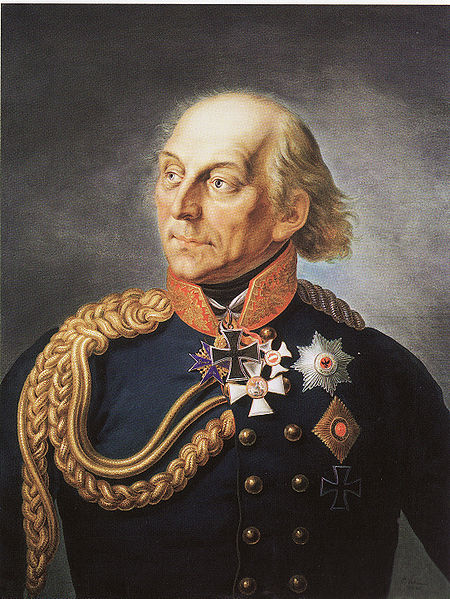<Back to Index>
- Philosopher Willem Jacob's Gravesande, 1688
- Painter Théodore Géricault, 1791
- General Field Marshal Johann David Ludwig Graf Yorck von Wartenburg, 1759
PAGE SPONSOR

Johann David Ludwig Graf Yorck von Wartenburg (26 September 1759 - 4 October 1830) was a Prussian Generalfeldmarschall instrumental in the switching of the Kingdom of Prussia from a French alliance to a Russian alliance during the War of the Sixth Coalition. Ludwig van Beethoven's "Yorckscher Marsch" is named in his honor.
The Field Marshal's surname is Yorck; Wartenburg is a battle honour appended to the surname as a title of distinction (cf. Britain's Montgomery of Alamein).
Yorck's
father, David Jonathan Jark (von Gostkowski), was born in Rowe in Pomerania (today Rówek, Poland),
to a Lutheran Pastor and was a Hauptmann (captain)
in Frederick II of
Prussia's army. Yorck's mother was born in Potsdam.
His family came from a small estate in Gostkow and traced its origins
from the Kashubians of Pomerania.
Yorck was born in Potsdam and changed his name from Jark to Yorck to make it look more English (York)
and dropped the "von Gostkowski". Yorck
entered the Prussian army in
1772, but after seven years' service was cashiered for disobedience,
having criticized his superior for his recruiting methods. Entering Dutch service three years later
he took part in the operations of 1783 - 84 in the East Indies as captain. He took part
with the French army in a battle against British troops in Cape Town.
Returning to Prussia in 1785 he was, on the death of Frederick the
Great, reinstated in his old service, and in 1794 took part in
the operations in Poland during the Kościuszko
Uprising, distinguishing himself especially at Szczekociny. Five
years afterwards Yorck began to make a name for himself as commander of
a light infantry regiment,
being one of the first to give prominence to the training of
skirmishers. In 1805 he was appointed to the command of an infantry
brigade, and in the disastrous Jena campaign he played a
conspicuous and successful part as a rearguard commander, especially at Altenzaun.
He was taken prisoner, severely wounded, in the last stand of Blücher's
corps at Lübeck. In the
reorganization of the Prussian army which followed the Treaty of Tilsit,
Yorck was one of the leading figures. At first major - general
commanding the West Prussian brigade, afterwards
inspector - general of light infantry, he was finally appointed second
in command to General Grawert,
the leader of the auxiliary corps which Prussia was compelled to send
in support of Napoleon's invasion of
Russia.
The two generals did not agree, Grawert being an open partisan of the
French alliance, and Yorck an ardent patriot, but before long Grawert
retired, and Yorck assumed the command. Opposed
in his advance on Riga by the Russian General Steingell,
Yorck displayed great skill in a series of combats which ended in the
retreat of the enemy to Riga. Throughout the campaign he had been the
object of many overtures from the enemy's generals, and though he had
hitherto rejected them, it was soon borne in upon him that the French
Grand Army was doomed. Marshal
MacDonald, his immediate French superior, retreated before the
corps of Diebitsch,
and Yorck found himself isolated. As a soldier his duty was to break
through, but as a Prussian patriot his position was more difficult. He
had to judge whether the moment was favorable for the war of
liberation; and, whatever might be the enthusiasm of his junior
staff officers, Yorck had no illusions as to the safety of his own
head. On 20 December the general made up his mind. The Convention of
Tauroggen armistice,
signed by Diebitsch and Yorck without consent of their king, declared
the Prussian corps "neutral". The news was received with the wildest
enthusiasm, but the Prussian Court dared not yet throw off the mask,
and an order was despatched suspending Yorck from his command pending a
court martial. Diebitsch refused to let the bearer pass through his
lines, and the general was finally absolved when the Treaty of Kalisz placed
Prussia on the side of the Allies. Yorck's act was nothing less than
the turning point of Prussian history. His veterans formed the nucleus
of the forces of East Prussia,
and Yorck himself in public took the final step by declaring war on
Napoleon as the commander of those forces. On 17
March 1813, Yorck made his entry into Berlin in
the midst of the wildest exuberance of patriotic joy. On the same day
the king declared war. During 1813 - 14 Yorck led his veterans with
conspicuous success. He covered Blücher's retreat after Bautzen and took a decisive part in the
battles on the Katzbach.
In the advance on Leipzig his corps won the action of Wartenburg (4 October) and took part in
the crowning victory in the Battle of the
Nations of 18
October. In the campaign in France, Yorck drew off the shattered
remnants of the
Osten - Sacken's corps at Montmirail,
and decided the day at Laon. The
storming of Paris was Yorck's last fight. In the campaign of 1815 none
of the older men were employed in Blücher's army, in order that August von
Gneisenau might
be free to assume command in case of the old prince's death. Yorck was
appointed to a reserve corps in Prussia, and, feeling that his services
were no longer required, he retired from the army. His master would not
accept his resignation for a considerable time, and in 1821 made him Generalfeldmarschall.
He had been made Graf Yorck von Wartenburg in 1814.
The remainder of his life was spent on his estate of Klein-Öls
(today Oleśnica Mała,
Poland) in Silesia,
a gift of the king. A statue by Christian
Daniel Rauch was
erected in Yorck's honor in Berlin in 1855. The former football club Yorck Boyen
Insterburg was
also named in honor of Yorck.